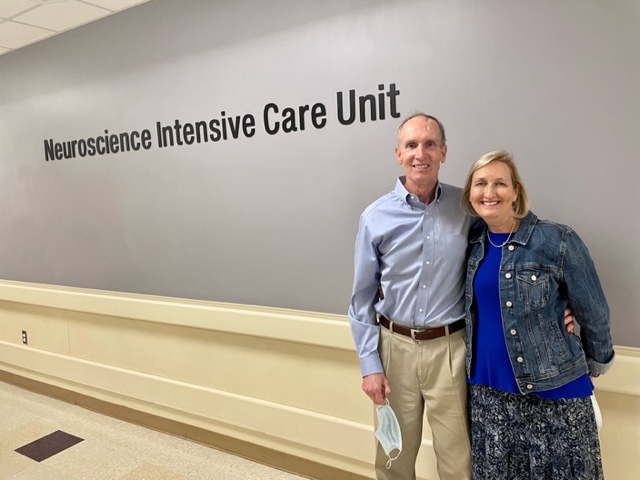
The healthy, active 61-year-old Houston man had sustained a traumatic brain injury upon fainting while getting out of bed. “He went to bed with indigestion,” says Karin. “Then he woke up in the middle of the night, got out of bed and passed out. I heard a crash, like a tree falling. Todd was lying flat on his back, unconscious."
“An Extreme Situation”
En route to the ER at Memorial Hermann Memorial City, the EMT called ahead to alert affiliated neurosurgeon Mark Dannenbaum, MD, associate professor in the Vivian L. Smith Department of Neurosurgery at McGovern Medical School at UTHealth Houston, that the patient’s intracranial pressure was rising. “We were in an extreme situation where we either operate now, to alleviate the pressure on the patient’s brain, or he would likely die,” says Dr. Dannenbaum.
Upon arrival at the ER, a CT scan showed severe traumatic brain injury and a skull fracture, and Todd was admitted to the hospital’s Neuro ICU.
When Todd arrived on the unit, he was still able to follow simple one-step commands, say his name and breathe on his own. But as his brain began to swell, his neurological function began to decline. Dr. Dannenbaum explained to Karin that without surgery, Todd’s brain would swell to the point where he would not survive. But even with surgery, Todd would face long-term challenges, and there was still a chance he would not survive his hospitalization.
Karin was given the difficult choice of continuing with full medical interventions, including the surgery to relieve the pressure on his brain, or making Todd comfortable but letting him pass away naturally, given the devastating neurological injury he had sustained. The entire ICU multidisciplinary team stood ready to support Karin and her family, regardless of her decision. After much family discussion and prayer, she consented to the surgery.
Lifesaving Surgery
On March 21, 2022, Dr. Dannenbaum and his surgical team performed decompressive hemicraniectomy, removing a portion of Todd’s skull to allow room for Todd’s brain to swell. While the surgery was a success, Todd experienced several complications afterwards, each of which was successfully addressed by the medical team. A tube was inserted into his windpipe (trachea) to help him breathe. A feeding tube was implanted to ensure he received adequate nutrition and safe medication delivery. He developed intracranial vasospasms (narrowing of the arteries caused by persistent contraction of the blood vessels, known as vasoconstriction) and blood clots. And because he developed a blockage of spinal fluid, a catheter, called a shunt, was placed to allow for spinal fluid drainage.
In the weeks following the surgery, Todd’s neurological condition fluctuated. He was unresponsive with the exception of slight movement in response to pain stimulation and a few times when he blinked and stuck out his tongue following commands. Throughout his ordeal, Karin rarely left his side but did leave him in her sister’s care the day their daughter gave birth to twins. She would sit and read books to him and watch golf, his favorite sport, on TV. His family took turns staying at his bedside as well, talking to him, reading to him, and playing his favorite music to try to keep him as engaged as possible.
TIRR Rehabilitation
After being discharged from Memorial Hermann Memorial City, Todd began a months-long journey of rehabilitation, first as an inpatient at TIRR Memorial Hermann, then as an inpatient at a neuro rehab facility in Galveston and finally, after being discharged to live at home, as an (outpatient) participant in TIRR’s Challenge Program.
While he was an inpatient at TIRR Memorial Hermann, Todd returned to Memorial Hermann Memorial City for his cranioplasty, a surgical procedure in which Dr. Dannenbaum restored the skull flap that had been removed during the initial surgery. Three weeks later, Dr. Dannenbaum placed a ventriculoperitoneal (VP) shunt in Todd’s brain to drain excess spinal fluid to prevent excess pressure.
A year later, Todd is ready to return to work as an accountant. He’s also gearing up to return to the golf course and to ride his dirt bike. And he is enjoying spending time with his three children and four grandchildren.
He is extremely grateful to his wife of 36 years for standing by him. “She has put me first for over a year now,” he says, “It’s time for her to take care of herself. Time for me to take care of things for her.”
Todd and his family are also grateful for the care they received at Memorial Hermann Memorial City and TIRR Memorial Hermann. "Thanks to the doctors, nurses and therapists who cared for me, I was able to meet my two youngest grandchildren and attend my son's wedding,” says Todd. “I lift weights and walk 2 to 4 miles a day. I have been able to get back to a happy and productive life and feel very fortunate to have been given a second chance."